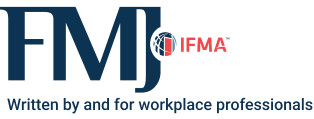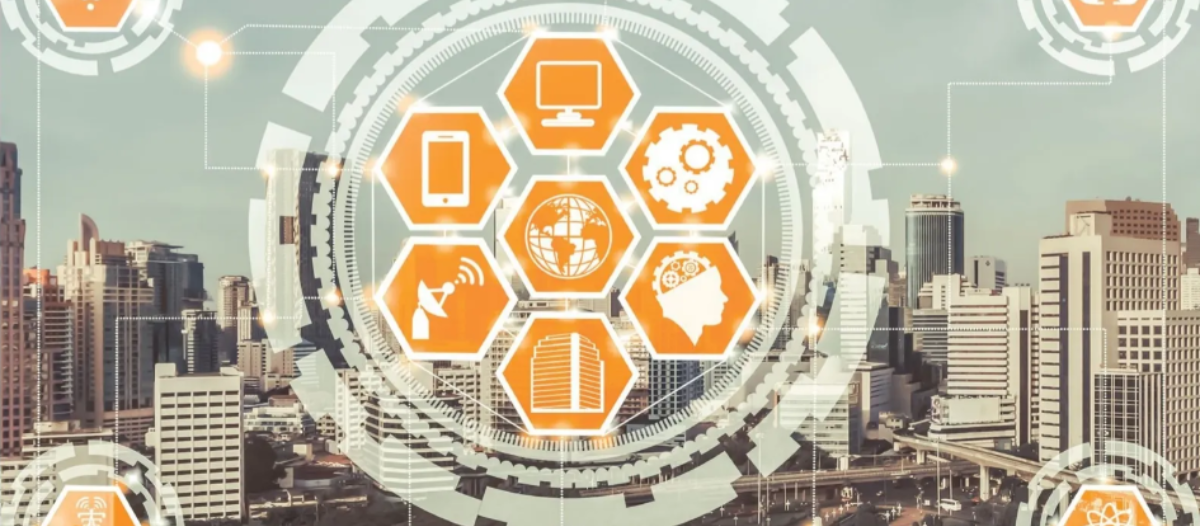A Long-term Investment
Growing FM’s next generation

With many experienced facility managers reaching retirement age, the time for the next generation of FM has come. As technology and digital transformation rapidly change the workforce, what are the responsibilities and goals of new FMs? The millennial and Gen-Z workforce undoubtedly holds a more holistic approach to business success, incorporating digital tools, collaboration opportunities and sustainability initiatives as an integral part of their daily job. To grow the next generation of FM, investment in an integrated approach to facilities success is key.
Leveraging technology for the modern workforce
FM has shifted significantly in recent years, especially with the influx of technology use and automation tools within the workforce. Currently, many software companies are using the selling point of easy employee adoption for their products. With the next generation of FM, there will be a clear shift from ease of use to features and scalability. Unlike generations prior, Gen-Z are truly digital natives, meaning they have grown up with technology from infancy. Technology is no longer an adoption process for them but an integral part of their daily lives, as well as a requirement for their work.
For FM employers, this means that investment in technology is non-negotiable. According to a recent study by the Workforce Institute regarding Gen-Z, one in four respondents say poor technology would affect their performance at work, and one in five say that they would not tolerate outdated technology in their position. As the next generation of FM enters the workforce, how can employers prepare and invest in relevant technology? The first step is to implement digital tools that focus on automation and efficiency within the workplace. For Gen-Z, the goal is to work smarter, utilizing these tools to propel growth for both their department and the organization. It is important to note that the younger generation is also highly accustomed to frequent communication and expects this to continue into the workplace. Outside of automation tools, communication tools through both generic and industry-specific software are necessities.
Enhancing overall employee experience
 To grow the next generation of FM, it is essential to understand the preferences, concerns and values they bring to the industry. One of the most substantial changes Gen-Z has brought to the workforce is the idea of the holistic employee experience. In a 2022 study completed by McKinsey, a third of 18 to 24 year-olds report believing their mental health negatively impacts their future job prospects. However, this belief declines with age, with reporting dropping 5-6 percent for every 10 years gained. For Gen-Z, the stigma around mental health when surrounded by their peers is minimal. However, as they enter the workforce among older generations, such as Gen-X, who will likely be in positions of leadership like human resources and management, there is still a gap surrounding the importance of mental health in the workplace.
To grow the next generation of FM, it is essential to understand the preferences, concerns and values they bring to the industry. One of the most substantial changes Gen-Z has brought to the workforce is the idea of the holistic employee experience. In a 2022 study completed by McKinsey, a third of 18 to 24 year-olds report believing their mental health negatively impacts their future job prospects. However, this belief declines with age, with reporting dropping 5-6 percent for every 10 years gained. For Gen-Z, the stigma around mental health when surrounded by their peers is minimal. However, as they enter the workforce among older generations, such as Gen-X, who will likely be in positions of leadership like human resources and management, there is still a gap surrounding the importance of mental health in the workplace.
Within FM, how can companies work to guide Gen-Z into the workforce comfortably? Outside of creating a collaborative and welcoming environment, encourage the use of employee assistance programs (EAPs), along with continued communication and check-ins from management surrounding employee well-being. It is important to note that the employee experience goes beyond an open conversation about mental health. For Gen-Z, work is not a day-in, day-out process. The next generation of FM has a distinct focus on work-life balance, resources for continued education and growth, and how their work makes an impact on a macrolevel.
For FM, this can be shown in a multitude of ways. For example, those entering the workforce may be more inclined to take positions in building information modeling, biophilic design or workplace services. This is because all these positions focus on:
- How buildings can be crafted for maximum efficiency,
- How biophilic design can play a role in the mental and physical well-being of employees, and
- How they can enhance the workplace experience for their generation, as well as the next.
When participating in long-term FM strategy, taking note of these large-scale trends for the future workforce is essential for propelling growth and enhancing workforce opportunities for Gen-Z.
Strengthening sustainability & ESG initiatives
In continuation of the discussion of Gen-Z’s holistic view of the modern workforce, it is necessary to note that sustainability and environmental, social and governance (ESG) initiatives are playing a pivotal role. First, understanding the differences between sustainability and ESG is important, as both play an equally important part in developing the next generation of FM in the workforce. Sustainability in FM focuses on how current and future FM practices will affect the environment, such as replacing outdated equipment to be more energy efficient, harnessing renewable energy sources for running a large facility, or enhancing asset maintenance, disposal and reuse processes. As the next generation enters the workforce, they expect sustainability initiatives to be in progress. They will likely want to play a critical part in expanding these initiatives as they grow in their FM career.
Growth of the next generation of FM ties in closely with ESG. While ESG has significant parallels with sustainability efforts, it is just one part of the puzzle. Sustainability fits into the environmental category of ESG, along with reducing a company’s carbon footprint, greenhouse gas awareness and more. However, the other two portions of ESG are equally important. Socially, ESG references diversity and inclusion within the workforce, as well as an organization’s impact on the local and national community. Furthermore, governance includes business decision making and the impact stakeholders have on their current company and the industry at large.
For those entering the FM workforce, ESG will significantly influence the future of their career. According to Deloitte’s 2023 Gen Z and Millennial Survey, six in 10 Gen-Z and millennials said environmental concerns are impacting their career and lifestyle decisions, and one in six have already changed jobs due to environmental concerns. As they enter management positions, the role that FMs play within the industry will continue to shift, identifying gaps within compliance, governance, social responsibility, technology and more. The next 10 years will undoubtedly be a turning point for the FM industry as older generations retire from their current positions and millennials and Gen-Z enter positions of management.
Navigating the gig economy
The term “gig economy” has become increasingly prevalent in recent years and is expected to continue as Gen-Z takes over the current workforce. In short, a gig economy is a market in which short-term contracts and freelancing take prevalence over traditional work. Gen-Z has taken the gig economy in stride for multiple reasons, and when growing the next generation of FMs, considering their reasoning behind this choice will help with adaptability from current FM workers. Outside of the importance of work-life balance for the younger generation, loyalty for Gen-Z is on an extreme spectrum compared to their older counterparts.
For Gen-Z in the workforce, brand and company loyalty takes significantly longer to be earned, but once earned, it is unwavering. When entering the workforce, Gen-Z prioritizes loyalty to their own personal growth over that of their company’s, meaning they are less likely to tie themselves down to a permanent position. The gig economy prioritizes flexibility, as well as additional learning and growth opportunities, making it an obvious choice when starting out in the FM industry. The gig economy is currently expanding three times faster than the total U.S. workforce, meaning now is the perfect time to initiate changes to prepare for hiring.
FM is known for being an industry in which employee retention is high, so navigating the gig economy for the incoming workforce requires adaptation. Although understanding this trend can be a learning curve, the gig economy offers significant benefits for FM teams. Choosing to hire contracted or freelance FM workers allows for more flexibility on the part of the employer, planning to increase labor for peak times within their industry. Additionally, this provides a level of cost-effectiveness by only hiring for a distinct period. As a result, facilities can prepare financially for additional labor costs while still working through their digital transformation process. In facility management, gig economy workers can be beneficial in a variety of ways, including consulting positions for building automation, sustainability, emergency management or compliance, to name a few. Contracted positions have also seen a significant rise in the manufacturing sector as the supply chain continues to level out from the uncertainty of previous years.
Creating a space for FM growth
There is no doubt that the next generation of FM workers will bring drastic change to the industry. Being present for this industry shift is an incredible opportunity, and those working within the FM industry have access to an abundance of possibilities, jobs and expansions as this shift continues. Growing the next generation of FM is not an easy task, but it is worthwhile. Gen-Z’s impact on the future of FM is a force to be reckoned with. They will not only be making changes to enhance FM technology, but will be the building blocks for the future of infrastructure, energy and more. Now is the time to invest in the next generation of FM, as they will be investing their knowledge, vision and values to propel an FM workforce never seen before.

Michael Saldi is the founder and CEO of SCLogic, a global facilities software company specializing in logistics solutions for enterprise, higher education, government, health care, pharmaceutical and banking industries. He is also a member of IFMA Chesapeake. As a thought leader in the facilities and logistics industries, Saldi is passionate about the impact of digital transformation and artificial intelligence on the future workforce.
Read more on Leadership & Strategy , Training and Career Advancement
Explore All FMJ Topics








